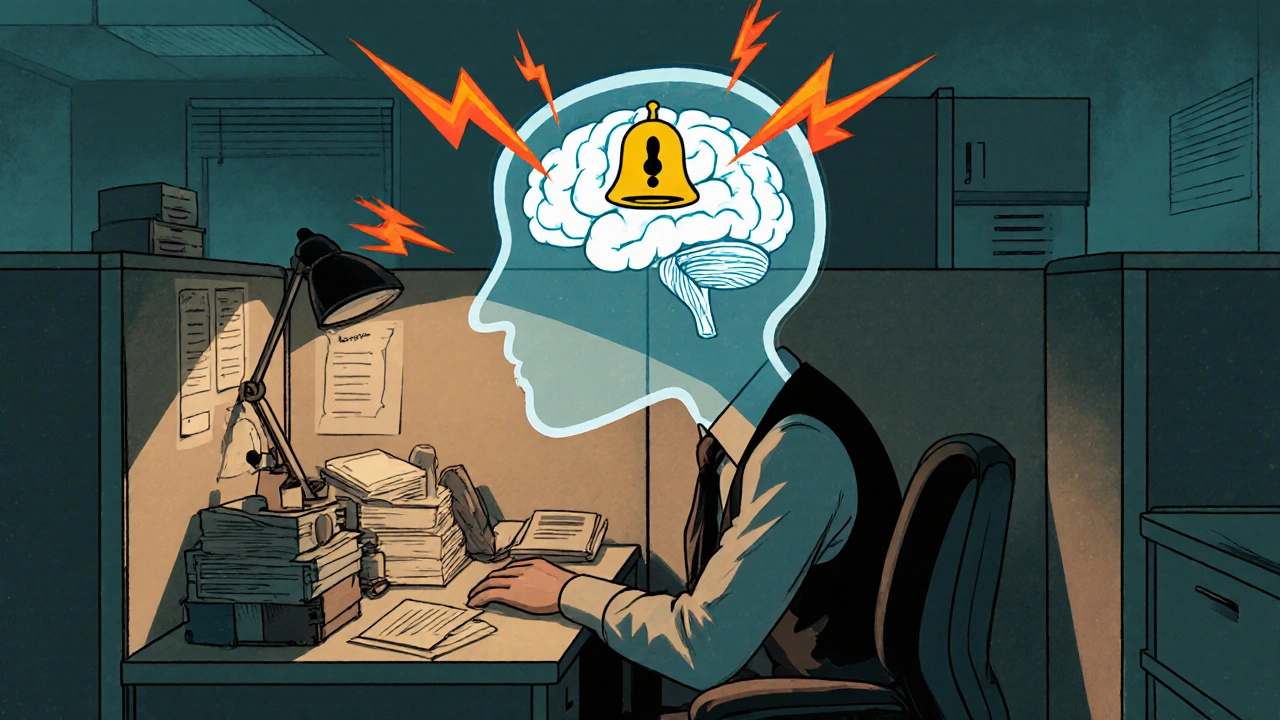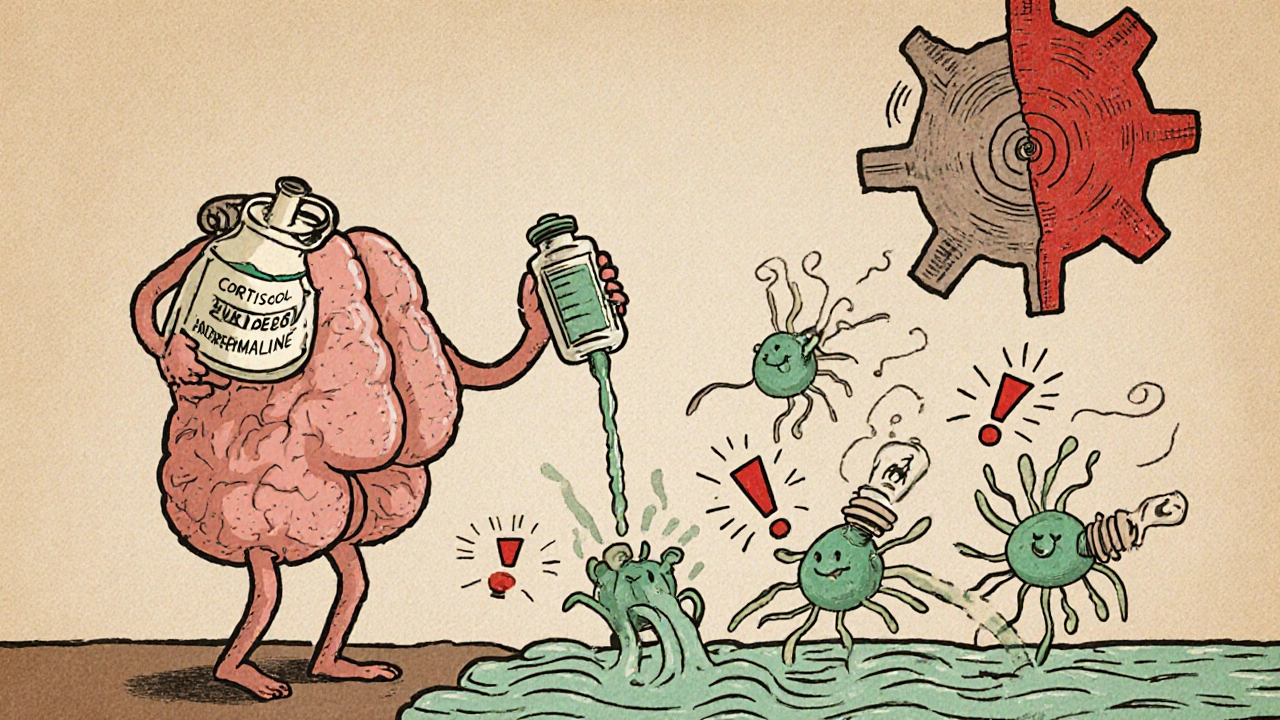How Stress Affects Epilepsy and Seizure Frequency
 Oct, 15 2025
Oct, 15 2025
Stress-Seizure Tracker
Track Your Stress & Seizures
Your Patterns
Log entries to see your patterns here
Current Baseline Seizures per week: 0
Stress Threshold Seizures often increase above 7/10 stress
Recommended Actions
Based on your entries, consider:
● Regular 4-7-8 breathing techniques
● 30 minutes of aerobic exercise 3x/week
● Sleep tracking (aim for 7-9 hours)
When it comes to stress and epilepsy, the connection is more than a coincidence. Many people with epilepsy notice that a tough week at work or a personal crisis can bring more seizures, while calm periods often seem to keep the condition under control. This article breaks down why stress matters, what the science says, and how you can tame stress to protect your brain.
The biology behind stress and seizures
Stress is the body’s built‑in alarm system. When a threat-real or imagined-appears, the hypothalamus triggers the release of cortisol and adrenaline. These hormones boost heart rate, sharpen focus, and prepare muscles for action. In a healthy brain this short‑term surge is harmless, but if the stress becomes chronic, the hormonal roller‑coaster can destabilize neuronal networks.
Epilepsy is a neurological disorder characterized by recurrent seizures. Seizures happen when groups of brain cells fire abnormally, overwhelming the brain’s natural inhibitory mechanisms. Stress interferes with those mechanisms in three main ways:
- Elevated cortisol lowers the threshold for neuronal firing, making it easier for a seizure to start.
- The autonomic nervous system shifts toward sympathetic dominance, which can trigger hyper‑excitability in seizure‑prone regions.
- Stress‑related sleep disturbances and changes in breathing patterns disrupt the brain’s electrical balance.
Acute vs. chronic stress: different impacts on seizure frequency
Not all stress is created equal. Researchers often split stress into two categories:
| Aspect | Acute Stress | Chronic Stress |
|---|---|---|
| Hormone spike | Sudden rise in cortisol and adrenaline (minutes-hours) | Persistently elevated cortisol (days-weeks) |
| Typical trigger | Unexpected events - loud noise, sudden fright | Ongoing pressures - work overload, anxiety disorder |
| Seizure impact | May provoke a single breakthrough seizure | Often increases baseline seizure count, can lead to clusters |
| Management tip | Immediate relaxation (deep breath, grounding) | Long‑term stress‑reduction program (CBT, exercise, sleep hygiene) |
What the evidence says
Clinical observations have been backed by data. A 2022 prospective study of 312 adults with focal epilepsy found that participants who scored above 20 on the Perceived Stress Scale experienced a 35% increase in monthly seizure frequency compared with low‑stress peers. Another 2020 meta‑analysis of 17 studies reported a pooled odds ratio of 1.68 for stress‑related seizure exacerbation.
These numbers matter because they show a clear statistical link, not just anecdotal chatter. Importantly, the studies also highlighted that stress‑related seizure spikes often happen within 24hours of the stressor, giving patients a practical window to intervene.

Tracking stress as a seizure trigger
If you suspect stress is nudging your seizures, start recording both variables. A simple two‑column journal works well:
- Write the date and time of each seizure.
- Note any stressful events in the preceding 24hours-work deadlines, arguments, medical appointments.
- Rate the intensity of the stress on a 1‑10 scale.
- Include sleep duration, caffeine intake, and medication adherence.
After a month, look for patterns. If seizures cluster after scores of 7 or higher, you’ve identified a concrete trigger.
Stress‑reduction techniques that really help epilepsy
Not every relaxation method works for everyone, but several have solid evidence behind them:
- Mindfulness‑based stress reduction (MBSR) - an eight‑week program that mixes meditation, body scans, and gentle yoga. A 2019 randomized trial showed a 22% reduction in seizure frequency among participants who completed MBSR.
- Cognitive‑behavioural therapy (CBT) - targets anxiety and negative thought loops. CBT has been linked to lower cortisol levels and improved seizure control.
- Regular aerobic exercise - 30minutes of moderate activity (walking, swimming, cycling) three times a week lowers baseline stress hormones and improves sleep quality.
- Controlled breathing - the 4‑7‑8 technique (inhale4sec, hold7sec, exhale8sec) can quickly shift the autonomic nervous system back to a parasympathetic state, often aborting an impending seizure.
- Sleep hygiene - aim for 7‑9hours, keep a consistent bedtime, and avoid screens an hour before sleep. Poor sleep is a double‑hit: it raises stress hormones and directly triggers seizures.
Pick two or three that fit your lifestyle and practice them consistently. Small, daily habits tend to out‑perform occasional “big” stress‑relief events.

When stress may require medical adjustment
Sometimes stress tips the scale so far that medication levels become inadequate. If you notice any of the following, talk to your neurologist:
- Sudden jump in seizure count that persists for more than two weeks.
- New seizure types (e.g., focal to generalized conversion).
- Significant weight change, which can affect drug metabolism.
- Co‑occurring depression or anxiety that worsens despite therapy.
Your doctor may adjust doses, add a rescue medication, or refer you to a psychologist experienced in epilepsy‑specific CBT. The goal is to keep both the neurological and the emotional side in balance.
Quick checklist for everyday stress management
- Log seizures and stressors daily.
- Practice a 5‑minute breathing reset whenever you feel a stress spike.
- Fit in at least 150minutes of aerobic activity per week.
- Schedule one mindfulness or CBT session each week.
- Maintain a consistent sleep‑wake routine.
Even ticking off a few of these items can make a noticeable dent in seizure frequency.
Frequently Asked Questions
Can stress really cause a seizure?
Yes. Stress raises cortisol and adrenaline, which lower the brain’s seizure threshold. Both acute and chronic stress have been shown in studies to increase seizure frequency.
How soon after a stressful event might a seizure occur?
Most researchers report a window of 0‑24hours. Some people notice seizures within minutes, especially after very intense acute stress.
Is meditation enough to replace medication?
Meditation is a powerful adjunct, but it does not replace anti‑epileptic drugs. Use it alongside prescribed treatment and discuss any changes with your neurologist.
What type of exercise is safest for someone with epilepsy?
Low‑impact aerobic activities such as brisk walking, swimming, or cycling are recommended. Always exercise in a safe environment and consider a buddy system for added security.
Should I adjust my medication if my stress level spikes?
Never adjust medication on your own. If stress consistently leads to more seizures, schedule a review with your neurologist. They may tweak the dose or add a rescue plan.

Ryan Smith
October 15, 2025 AT 19:27Oh great, another reminder that my nervous system is basically a stress‑powered fireworks show.
John Carruth
November 3, 2025 AT 18:27Reading through the breakdown of how cortisol and adrenaline can tip the neuronal balance really drives home why we need a proactive plan, especially since the article points out that chronic stress keeps cortisol elevated for days or weeks, which is a recipe for hyper‑excitability.
First off, I love that the piece emphasizes logging both seizures and stressors – that kind of data‑driven approach is the backbone of any successful management strategy.
Second, the distinction between acute spikes and chronic pressure is crucial; a sudden loud noise might trigger a single breakthrough seizure, but ongoing workplace anxiety can raise the baseline seizure count.
Third, the cited 2022 prospective study showing a 35% increase in seizure frequency for high‑stress participants is a solid reminder that we’re not just dealing with anecdotal chatter.
Fourth, the recommendation to practice the 4‑7‑8 breathing technique is spot on because it directly shifts the autonomic nervous system toward parasympathetic dominance, which can blunt that adrenaline surge.
Fifth, integrating mindfulness‑based stress reduction for eight weeks isn’t just a feel‑good suggestion; the 22% reduction in seizure frequency reported in the 2019 trial validates its clinical relevance.
Sixth, regular aerobic exercise isn’t just about cardiovascular health; it actually lowers baseline cortisol levels, giving the brain a more stable environment.
Seventh, sleep hygiene cannot be overstated – consistent sleep patterns reduce both stress hormones and the propensity for nocturnal seizures.
Eighth, the article’s quick checklist is a handy daily reminder: logging, breathing, exercise, mindfulness, and sleep – a five‑point routine that can be integrated into a morning or evening ritual.
Ninth, when stress spikes lead to a sustained increase in seizures over two weeks, the suggestion to talk to a neurologist about possible medication adjustments is prudent and could prevent a cascade of uncontrolled events.
Tenth, it’s worth noting that stress‑related weight changes can affect drug metabolism, an often‑overlooked factor in dosage decisions.
Eleventh, involving a psychologist experienced in epilepsy‑specific CBT addresses both the emotional triggers and the physiological feedback loop.
Twelfth, the article’s call for patients to look for patterns after a month of journaling empowers them to become active participants in their care.
Thirteenth, the inclusion of both low‑impact aerobic activities and gentle yoga provides options for varying fitness levels and physical limitations.
Fourteenth, the fact that seizure spikes often occur within a 0‑24‑hour window after a stressor gives a practical timeframe for intervention, whether through breathing, grounding, or a quick mindfulness pause.
Fifteenth, building a support network – whether friends, family, or a seizure‑tracking community – adds an extra layer of accountability and encouragement.
Finally, remember that stress management is a marathon, not a sprint; consistency in the small habits outlined will likely yield the most noticeable dent in seizure frequency over time.
Melodi Young
November 22, 2025 AT 18:27Honestly, the journaling tip is the gold nugget here – just grab a cheap notebook and jot down the time of each seizure, any stressful event in the prior 24 hours, and a quick 1‑10 stress rating. It’s not rocket science, but over a month you’ll see if those 8‑hour work meetings are your hidden culprits. Also, don’t discount the power of a quick 5‑minute breathing reset; the 4‑7‑8 method mentioned works like a charm for me when a deadline looms. If you’re looking for a structured program, the eight‑week MBSR is worth the commitment – the data backs it up, and you’ll probably feel calmer in general, which indirectly helps with seizure control. And yes, stick to consistent sleep times; the brain really hates irregular REM cycles.
Tanna Dunlap
December 11, 2025 AT 18:27While the advice sounds helpful on the surface, it borders on the typical “just be more mindful” fluff that ignores deeper systemic issues. Suggesting people simply track stress without addressing the root causes – like toxic work environments or socioeconomic pressures – is almost negligent. Moreover, the moralistic tone of “you need to log everything” can feel like shaming to those already struggling with uncontrolled seizures.
Troy Freund
December 30, 2025 AT 18:27It’s fascinating how the body’s stress response mirrors philosophical concepts of tension and release – the nervous system is perpetually seeking equilibrium, and chronic stress tilts that balance. If we view seizures as a manifestation of the brain’s plea for homeostasis, then each breathing exercise or mindfulness session is a tiny negotiation toward peace.
Liam McDonald
January 18, 2026 AT 18:27I appreciate the thoroughness of the article and the practical steps it outlines. Implementing a consistent journaling habit, coupled with regular aerobic activity, can indeed facilitate better seizure management. Should you encounter any difficulties, please consider consulting a healthcare professional for personalized guidance.
william smith
February 6, 2026 AT 18:27Quick tip: set a daily alarm to log stress and seizure events; it’s a simple habit that keeps the data reliable.